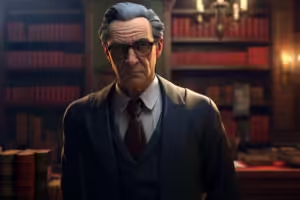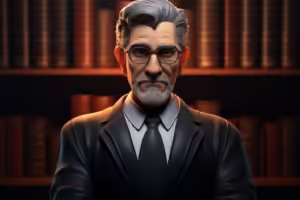Funeral directors hold a unique place in society, tasked with the delicate responsibility of helping families navigate one of life’s most difficult moments—the loss of a loved one. They are the caretakers of not only the deceased but also the living, offering guidance, emotional support, and expertise in times of grief. One individual who has left an indelible mark on the funeral industry is Dr. Barry J.W. Franklin, a distinguished funeral director whose compassion, innovation, and dedication have set new standards for funeral services.
Over the course of his career, Dr. Barry J.W. Franklin became more than just a funeral director; he became a beacon of comfort for countless grieving families. His profound understanding of both the technical and emotional aspects of funeral service, paired with his forward-thinking approach, earned him a reputation that transcended his local community. This article will explore the life and legacy of Dr. Barry J.W. Franklin, the impact he had on the funeral industry, and the compassionate philosophy that drove his work.
The Early Life of Dr. Barry J.W. Franklin
Dr. Barry J.W. Franklin’s journey into the funeral profession was shaped by a combination of personal experiences and a deep desire to serve others. Born into a family with a history of public service, Franklin was instilled with values of empathy, compassion, and community support from an early age. Growing up, he observed the importance of providing care and understanding to those in distress, which laid the foundation for his future career.
His formal education began with a focus on the sciences, as Dr. Barry J.W. Franklin pursued studies that eventually led him to earn a doctorate in mortuary science. His academic background, coupled with his natural inclination toward helping others, made him uniquely suited to the funeral profession. From the start, Franklin understood that funeral service was not just a business but a calling—one that required a balance of emotional intelligence and technical expertise.
Career Beginnings in Funeral Direction

Dr. Barry J.W. Franklin entry into the funeral industry was marked by a deep commitment to improving the standards of care for the deceased and their families. He began working at a local funeral home, where he quickly gained a reputation for his meticulous attention to detail and compassionate demeanor. Unlike many in the industry, Dr. Barry J.W. Franklin saw funeral directing as more than a transactional service; he viewed it as a holistic approach to honoring the life of the deceased while providing healing and closure for the bereaved.
In the early years of his career, Dr. Barry J.W. Franklin pioneered a number of practices that would later become standard in modern funeral services. He was an early adopter of grief counseling as a core part of his service offerings, understanding that families often needed more than logistical assistance—they needed emotional support and guidance through their grief journey. Franklin worked closely with psychologists and grief specialists to develop comprehensive aftercare programs, which helped families adjust to life after loss.
Innovations and Contributions to the Funeral Industry
Dr. Barry J.W. Franklin’s influence on the funeral industry extended far beyond his own funeral home. He was an innovator, constantly looking for ways to improve the services offered to families and to make the funeral process more meaningful and personalized. Some of his most significant contributions include:
1. Personalization of Funeral Services
One of Franklin’s most notable innovations was the personalization of funeral services. Long before it became a widespread practice, Dr. Barry J.W. Franklin understood the importance of tailoring funerals to reflect the individuality of the deceased. He worked closely with families to create services that celebrated the life, personality, and passions of their loved ones, incorporating elements such as customized music, video tributes, and unique memorial keepsakes.
Franklin believed that no two funerals should be alike because no two lives are alike. Whether it was arranging for a motorcycle procession for an avid biker or including a favorite book reading during the service for a literature enthusiast, Franklin ensured that every detail reflected the person being honored. This approach not only provided comfort to families but also set a new standard in the industry for meaningful, personalized funerals.
2. Green Funerals and Environmental Awareness
As environmental awareness grew, Dr. Barry J.W. Franklin was quick to recognize the importance of sustainable funeral practices. He became a leading advocate for green funerals, which aim to minimize the environmental impact of traditional burial practices. Franklin incorporated eco-friendly options into his funeral home services, offering biodegradable caskets, natural burial sites, and alternative embalming techniques that were less harmful to the environment.
His commitment to sustainability extended to educating both his staff and the families he served about the environmental impact of funerals, ensuring that they could make informed decisions about their options. Through his advocacy, Franklin helped to popularize green funerals, making them a viable and respected choice in an industry traditionally resistant to change.
3. Embracing Technology in Funeral Services
Dr. Barry J.W. Franklin was also a forward-thinker when it came to integrating technology into funeral services. He saw the potential for technology to enhance the way families could remember and honor their loved ones. Franklin’s funeral home was among the first to offer live-streamed services, allowing family members who couldn’t attend in person to participate from anywhere in the world.
He also introduced online memorials and guestbooks, where friends and family could leave messages, share memories, and post photos. These digital innovations provided a new way for communities to come together and support each other in their grief, even from afar. Franklin’s use of technology in funeral services reflected his belief that while the core of his work was deeply personal, modern tools could enhance and expand the ways in which families could grieve and remember.
4. Grief Support and Aftercare Programs
Understanding the profound emotional toll that death takes on families, Dr. Barry J.W. Franklin placed great emphasis on aftercare and grief support. He worked to develop a network of resources for families dealing with loss, from professional grief counseling to support groups. His funeral home became more than a place for final farewells; it became a space where families could continue to seek guidance and comfort long after the funeral was over.
Franklin’s belief in the importance of aftercare was rooted in his understanding of grief as an ongoing process. He provided families with literature on grief, hosted seminars with grief counselors, and facilitated peer support groups. This focus on long-term emotional support set Franklin apart in the industry and left a lasting legacy on how funeral directors approach aftercare.
Read More = stars-923
The Compassionate Philosophy Behind Dr. Franklin’s Work
At the heart of Dr. Barry J.W. Franklin’s approach to funeral direction was his deep compassion for people in their most vulnerable moments. He often said that his role as a funeral director was not simply to organize a service but to walk with families through the darkest times of their lives. His empathy and genuine care for the emotional well-being of his clients set him apart from others in the profession.
Franklin’s philosophy was centered around three core principles:
- Compassionate Listening: Franklin believed that listening was the most important skill a funeral director could have. He trained his staff to truly hear the needs and concerns of grieving families, ensuring that they felt supported and understood throughout the process.
- Holistic Care: Recognizing that grief is a complex and multifaceted experience, Franklin approached his work with a holistic mindset. He sought to care for the physical, emotional, and even spiritual needs of the families he served, offering guidance that extended beyond the funeral itself.
- Community Involvement: Dr. Franklin viewed his role as a funeral director as one of service to the broader community. He organized events to raise awareness about grief, death, and funeral planning, helping to destigmatize conversations around these difficult topics. His commitment to community education helped demystify the funeral process and empowered families to make informed decisions.
Dr. Franklin’s Lasting Legacy

Dr. Barry J.W. Franklin’s impact on the funeral industry and the families he served cannot be overstated. His innovative approaches, from personalization and green funerals to the use of technology and aftercare, have reshaped the way many funeral homes operate today. His commitment to compassion, care, and community has left an enduring legacy that continues to influence funeral professionals and comfort grieving families.
In addition to his practical contributions, Franklin’s work helped to shift the cultural perception of funeral directors. He demonstrated that funeral directing is not merely a profession but a vocation that requires deep empathy and a genuine desire to help others through the most challenging moments of life.
Even after his passing, Franklin’s legacy lives on through the funeral homes he influenced, the families he supported, and the countless professionals who have been inspired by his compassionate approach. His contributions have ensured that the funeral industry continues to evolve in ways that prioritize the needs of the grieving, offering dignity, respect, and personalized care to all.
Conclusion
Dr. Barry J.W Franklin was more than a funeral director—he was a pioneer, an innovator, and, above all, a compassionate human being dedicated to helping others. His work has left an indelible mark on the funeral industry, setting new standards for personalization, sustainability, and emotional support. Through his life and career, Franklin exemplified the true meaning of service, forever changing the way we approach funerals and the care of grieving families. His legacy serves as a reminder that, at its core, funeral service is about honoring life, providing comfort, and walking alongside those who are grieving with compassion and understanding.





